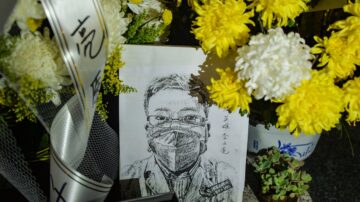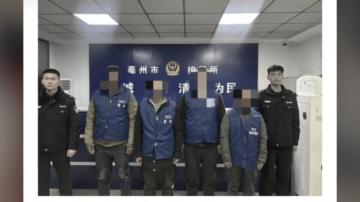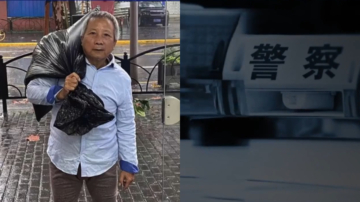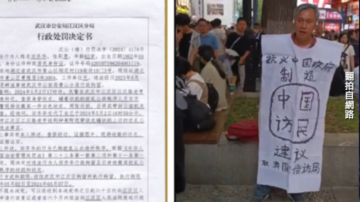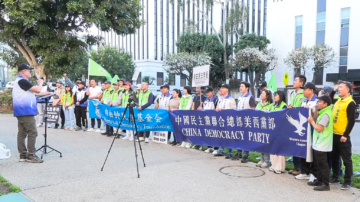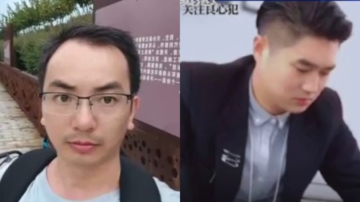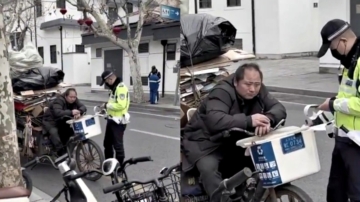【新唐人2015年01月26日讯】去年12月底,中国传媒大学互联网信息研究院发表了一份有关“2014网路舆论环境”的分析报告。
报告中指出,自中纪委和各地纪委监察部门开通官方网站和网络举报通道后,中国反腐舆情进入官方主导的时代,网路反腐(或称民间反腐)出现了“断崖式”降温。对此,港媒也指出,大陆民间反腐已经陷入寒冬。
报告引用中国传媒大学互联网信息研究院统计称,2014年由网络举报而揭露的腐败案件仅51件,全年总和不及网络反腐“鼎盛时期”一个季度的件数。而与之相对的是,中央和各地纪委官网举报迅速引领网上反腐舆情,“正规军”出击成效显着,官方牢牢把握住舆论话语权。
对此,民间则持完全不同的看法,认为民间反腐“降温”,并不是因为甚么官方反腐“成效显着”,而是百姓不敢发声了。
《人民监督网》创办人公民记者朱瑞峰:“它这个报告是反的,中国现在进入互联网‘非常态’,因为甚么呢?以前互联网非常活跃,民间反腐的声音非常大。现在对舆论的打压非常厉害,民间确实有一部份人降温了,有些人不敢说话,因为舆论收紧了嘛,好多人被抓、被威胁不敢说话了。”
大陆民间反腐记者朱瑞峰,曾因率先曝光重庆原北碚区书记雷政富不雅视频,而广为人知,他创办的《人民监督网》,也因此成为大陆民间最知名的反腐网站之一。但是自从中央和各地纪委等官方举报网站陆续开通后,《人民监督网》、《中国舆论监督网》、“正义反腐网”等民间反腐网站,都遭到了最严厉的封杀。
朱瑞峰:“它们进行封锁非常厉害,起码两天封杀一次,对我们这些网站。我的微博,像新浪微博已经到朱瑞峰18世了,我的腾讯微博已经到朱瑞峰7了,我们不断升级注册新的用户。你看我的粉丝最多都达到100多万人,现在微博都被封了,我们注册的新帐号没有几万人。”
除了针对民间反腐网站,敢于举报贪腐官员的公民也受到了严厉打压。据大陆媒体报导,浙江温州永嘉县一位官员,因为在网络被人曝光开房200多次,被纪委找去谈话,之后不久就卧轨自杀。而两位举报人却被警方“以涉嫌非法获取公民信息罪”刑事拘留,两位举报人在法庭上说,自己是揭露官员违法行为,不算违法。
对此,维权律师唐吉田认为,如果这位官员被曝光的违法行为与他的工作有关,就不属于个人隐私范围,应该接受民众的监督。
大陆维权律师唐吉田:“因为这是他作为公职人员这个角色所决定的。就是他必须时时处处在与职务有关的行为或者受职务影响的活动当中,接受公众监督。如果公民对他违反社会公共道德行为进行监督,那么这个方式方法也是可以多样的。如果作为官方动辄以刑罚来对待,显然一方面是对公民权利的一种侵犯,在一个对所谓的‘阳光政治’、‘反腐倡廉’都有非常消极的影响。”
唐吉田还指出,如果举报人确实因为揭露官员腐败而遭到当局构陷,那么说明当局在传递一种信号,也就是:反腐是党自家的事情,与你们公众没有甚么关系,如果轻易介入,就要付出代价。
中共当局为甚么如此打压民间反腐?朱瑞峰指出,以往民间反腐,每爆料一起案件,形成舆论压力后,中纪委才会被动的去查,但其中有很多官员是当局不想碰触的。而当局大力提倡“官方反腐”,强调“官方把握舆论话语权”,其实就是为了方便“选择性反腐”,而百姓真正希望查处的贪官,却藉机逍遥法外。
朱瑞峰:“普通公民、普通的记者都发不出声音,必须按照官方统一口径去说,也就是他的反腐败是定向反腐败,也就是选择性的反腐败。”
据了解,过去一年朱瑞峰报导了10多名官员的贪腐或作风问题,并蒐集到了足够的证据,但至今没有一人因此受查。
采访/朱智善 编辑/张天宇
The Flourishing Age of Non-Governmental Anti-Corruption
Vanishes Under Governmental Crackdown
Dec 2014, Communication University of China (CUC) published
a report regarding "Online Public Opinion Circumstances in 2014".
The report said that China's anti-corruption movement
has come into the age where government dominates
after the Central Discipline Committee and local discipline
supervision departments opened official corruption-reporting
channels.
Non-governmental (citizens) anti-corruption activities plunged.
Regarding this topic, Hong Kong media also agreed that China's
non-governmental anti-corruption movements plunged.
Based upon statistical data from CUC, the report said that in
2014 only 51 corruption cases were reported
via non-governmental reporting channels.
Over a year, the total number of corruption cases reported
through non-governmental ways is less that the total number
reported in a quarter during its peak time.
In contrast, the central and local governmental discipline
supervision came to dominate and the results were effective.
The government gained tight control on public opinion.
Regarding this, people hold different points of view.
It's said that non-governmental anti-corruption has cooled
down because people are too scared to voice their opinion.
It's not because governmental ant-corruption is too "effective".
Zhu Ruifeng, founder of "rmjdw.com":
"The report by Communication University of China
gave a false account of the true facts.
China's internet has come into an abnormal period.
Earlier, people were very active on the internet and the
voice of non-governmental anti-corruption was very loud.
Now the crackdown on public opinion is very severe.
Some people were scared away.
As the government takes tighter control of public opinion,
a lot of people have been arrested or threatened
and they are too scared to voice their opinions anymore."
Zhu Ruifeng, non-governmental anti-corruption reporter,
has been well known by people for being the first to report
the graceless video of Lei Zhengfu,
former Sectary of Chongqing Beibei District.
The website "rmjdw.com" he created thus became one of the
most famous anti-corruption websites.
Nonetheless, since central and local governmental discipline
structures opened the official corruption-reporting websites,
non-governmental websites, like "rmjdw.com",
"yulun53.com" and "zgzyff.hk" etc, were blocked or shut down.
Zhu Ruifeng: "The websites have been blocked frequently,
at least once every two days.
My micro-blog account, like my Sina micro-blog account,
is 18th generation, and my Tencent micro-blog account
is 7th generation. We have to keep creating new accounts
when our old ones are shut down or blocked.
My account used to have as many as 1 million followers,
but now my new account has many fewer followers."
Not only were non-governmental anti-corruption websites
cracked down on,
the citizens that had the courage to report corrupt officials
have also been cracked down. As reported by China's media,
an official from Yongjia County, Wenzhou, Zhejian, was
exposed on the internet that he hooked up with someone
in a hotel more than 200 times.
Later, the discipline committee talked to this official.
He promptly committed suicide by jumping in front of a train.
But, the two people who reported the official were arrested
under the charge of "illegally obtaining citizens' information".
The two people defended themselves in court that
they were disclosing the official's illegal behaviors
and they didn't act against the law.
Regarding this, Tang Jitian, human rights lawyer, stated that
if the illegal behaviors exposed were related to the official's job,
it's not private information, and should be supervised by people.
Tang Jitian: "Because he is a government official,
he has to be supervised for anything he did related to his job.
If citizens spotted his being against the social moral standard,
the supervision methods can be various.
However, if citizens were legally punished for their supervision rights,
it's violating citizen rights.
It'll negatively influence so-called "sunlight politics"
and "anti-corruption".
Tang Jitian also pointed out that if the government
makes a false charge against those who report corrupt officials,
the government then is signaling that anti-corruption
is the business of the CCP itself and
it's nothing to do with ordinary people.
If you do want to get involved, you will have to pay the price. "
Why does the CCP make so much effort to crack down on
non-governmental anti-corruption activities?
Zhu Ruifeng pointed out that in the past
the Central Discipline Committee only investigated
corrupt officials under pressure from non-governmental
anti-corruption power.
However, there are a lot of officials
that the Central Discipline Committee doesn't want to touch.
Therefore, "official anti-corruption" has been promoted
so that "anti-corruption" can be enforced selectively.
Those corrupt officials that ordinary people hope
the Central Discipline Committee comes to investigate
go unpunished.
Zhu Ruifeng: "Ordinary citizens or reporters can't voice their
opinions because they have to speak one voice
with the government."
Last year, Zhu Ruifeng reported more than 10 officials
with solid proofs, but none of them have been investigated yet.
Interview/Zhu Zhishan Edit/Zhang Tianyu
报告中指出,自中纪委和各地纪委监察部门开通官方网站和网络举报通道后,中国反腐舆情进入官方主导的时代,网路反腐(或称民间反腐)出现了“断崖式”降温。对此,港媒也指出,大陆民间反腐已经陷入寒冬。
报告引用中国传媒大学互联网信息研究院统计称,2014年由网络举报而揭露的腐败案件仅51件,全年总和不及网络反腐“鼎盛时期”一个季度的件数。而与之相对的是,中央和各地纪委官网举报迅速引领网上反腐舆情,“正规军”出击成效显着,官方牢牢把握住舆论话语权。
对此,民间则持完全不同的看法,认为民间反腐“降温”,并不是因为甚么官方反腐“成效显着”,而是百姓不敢发声了。
《人民监督网》创办人公民记者朱瑞峰:“它这个报告是反的,中国现在进入互联网‘非常态’,因为甚么呢?以前互联网非常活跃,民间反腐的声音非常大。现在对舆论的打压非常厉害,民间确实有一部份人降温了,有些人不敢说话,因为舆论收紧了嘛,好多人被抓、被威胁不敢说话了。”
大陆民间反腐记者朱瑞峰,曾因率先曝光重庆原北碚区书记雷政富不雅视频,而广为人知,他创办的《人民监督网》,也因此成为大陆民间最知名的反腐网站之一。但是自从中央和各地纪委等官方举报网站陆续开通后,《人民监督网》、《中国舆论监督网》、“正义反腐网”等民间反腐网站,都遭到了最严厉的封杀。
朱瑞峰:“它们进行封锁非常厉害,起码两天封杀一次,对我们这些网站。我的微博,像新浪微博已经到朱瑞峰18世了,我的腾讯微博已经到朱瑞峰7了,我们不断升级注册新的用户。你看我的粉丝最多都达到100多万人,现在微博都被封了,我们注册的新帐号没有几万人。”
除了针对民间反腐网站,敢于举报贪腐官员的公民也受到了严厉打压。据大陆媒体报导,浙江温州永嘉县一位官员,因为在网络被人曝光开房200多次,被纪委找去谈话,之后不久就卧轨自杀。而两位举报人却被警方“以涉嫌非法获取公民信息罪”刑事拘留,两位举报人在法庭上说,自己是揭露官员违法行为,不算违法。
对此,维权律师唐吉田认为,如果这位官员被曝光的违法行为与他的工作有关,就不属于个人隐私范围,应该接受民众的监督。
大陆维权律师唐吉田:“因为这是他作为公职人员这个角色所决定的。就是他必须时时处处在与职务有关的行为或者受职务影响的活动当中,接受公众监督。如果公民对他违反社会公共道德行为进行监督,那么这个方式方法也是可以多样的。如果作为官方动辄以刑罚来对待,显然一方面是对公民权利的一种侵犯,在一个对所谓的‘阳光政治’、‘反腐倡廉’都有非常消极的影响。”
唐吉田还指出,如果举报人确实因为揭露官员腐败而遭到当局构陷,那么说明当局在传递一种信号,也就是:反腐是党自家的事情,与你们公众没有甚么关系,如果轻易介入,就要付出代价。
中共当局为甚么如此打压民间反腐?朱瑞峰指出,以往民间反腐,每爆料一起案件,形成舆论压力后,中纪委才会被动的去查,但其中有很多官员是当局不想碰触的。而当局大力提倡“官方反腐”,强调“官方把握舆论话语权”,其实就是为了方便“选择性反腐”,而百姓真正希望查处的贪官,却藉机逍遥法外。
朱瑞峰:“普通公民、普通的记者都发不出声音,必须按照官方统一口径去说,也就是他的反腐败是定向反腐败,也就是选择性的反腐败。”
据了解,过去一年朱瑞峰报导了10多名官员的贪腐或作风问题,并蒐集到了足够的证据,但至今没有一人因此受查。
采访/朱智善 编辑/张天宇
The Flourishing Age of Non-Governmental Anti-Corruption
Vanishes Under Governmental Crackdown
Dec 2014, Communication University of China (CUC) published
a report regarding "Online Public Opinion Circumstances in 2014".
The report said that China's anti-corruption movement
has come into the age where government dominates
after the Central Discipline Committee and local discipline
supervision departments opened official corruption-reporting
channels.
Non-governmental (citizens) anti-corruption activities plunged.
Regarding this topic, Hong Kong media also agreed that China's
non-governmental anti-corruption movements plunged.
Based upon statistical data from CUC, the report said that in
2014 only 51 corruption cases were reported
via non-governmental reporting channels.
Over a year, the total number of corruption cases reported
through non-governmental ways is less that the total number
reported in a quarter during its peak time.
In contrast, the central and local governmental discipline
supervision came to dominate and the results were effective.
The government gained tight control on public opinion.
Regarding this, people hold different points of view.
It's said that non-governmental anti-corruption has cooled
down because people are too scared to voice their opinion.
It's not because governmental ant-corruption is too "effective".
Zhu Ruifeng, founder of "rmjdw.com":
"The report by Communication University of China
gave a false account of the true facts.
China's internet has come into an abnormal period.
Earlier, people were very active on the internet and the
voice of non-governmental anti-corruption was very loud.
Now the crackdown on public opinion is very severe.
Some people were scared away.
As the government takes tighter control of public opinion,
a lot of people have been arrested or threatened
and they are too scared to voice their opinions anymore."
Zhu Ruifeng, non-governmental anti-corruption reporter,
has been well known by people for being the first to report
the graceless video of Lei Zhengfu,
former Sectary of Chongqing Beibei District.
The website "rmjdw.com" he created thus became one of the
most famous anti-corruption websites.
Nonetheless, since central and local governmental discipline
structures opened the official corruption-reporting websites,
non-governmental websites, like "rmjdw.com",
"yulun53.com" and "zgzyff.hk" etc, were blocked or shut down.
Zhu Ruifeng: "The websites have been blocked frequently,
at least once every two days.
My micro-blog account, like my Sina micro-blog account,
is 18th generation, and my Tencent micro-blog account
is 7th generation. We have to keep creating new accounts
when our old ones are shut down or blocked.
My account used to have as many as 1 million followers,
but now my new account has many fewer followers."
Not only were non-governmental anti-corruption websites
cracked down on,
the citizens that had the courage to report corrupt officials
have also been cracked down. As reported by China's media,
an official from Yongjia County, Wenzhou, Zhejian, was
exposed on the internet that he hooked up with someone
in a hotel more than 200 times.
Later, the discipline committee talked to this official.
He promptly committed suicide by jumping in front of a train.
But, the two people who reported the official were arrested
under the charge of "illegally obtaining citizens' information".
The two people defended themselves in court that
they were disclosing the official's illegal behaviors
and they didn't act against the law.
Regarding this, Tang Jitian, human rights lawyer, stated that
if the illegal behaviors exposed were related to the official's job,
it's not private information, and should be supervised by people.
Tang Jitian: "Because he is a government official,
he has to be supervised for anything he did related to his job.
If citizens spotted his being against the social moral standard,
the supervision methods can be various.
However, if citizens were legally punished for their supervision rights,
it's violating citizen rights.
It'll negatively influence so-called "sunlight politics"
and "anti-corruption".
Tang Jitian also pointed out that if the government
makes a false charge against those who report corrupt officials,
the government then is signaling that anti-corruption
is the business of the CCP itself and
it's nothing to do with ordinary people.
If you do want to get involved, you will have to pay the price. "
Why does the CCP make so much effort to crack down on
non-governmental anti-corruption activities?
Zhu Ruifeng pointed out that in the past
the Central Discipline Committee only investigated
corrupt officials under pressure from non-governmental
anti-corruption power.
However, there are a lot of officials
that the Central Discipline Committee doesn't want to touch.
Therefore, "official anti-corruption" has been promoted
so that "anti-corruption" can be enforced selectively.
Those corrupt officials that ordinary people hope
the Central Discipline Committee comes to investigate
go unpunished.
Zhu Ruifeng: "Ordinary citizens or reporters can't voice their
opinions because they have to speak one voice
with the government."
Last year, Zhu Ruifeng reported more than 10 officials
with solid proofs, but none of them have been investigated yet.
Interview/Zhu Zhishan Edit/Zhang Tianyu

